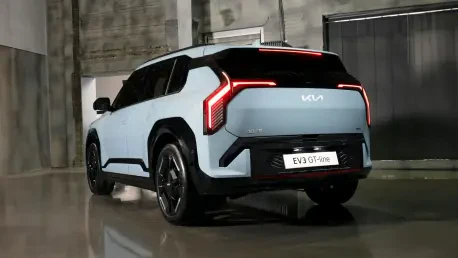The U.S. electric vehicle (EV) industry is facing a profound challenge as geopolitical dynamics influence its trajectory and potential for growth. At the heart of this challenge is the limited access to rare-earth minerals, such as neodymium and dysprosium, which are critical components in the manufacturing of EV motors. This scarcity is primarily due to China’s overwhelming control of these resources, fostering a dependency that threatens the stability and progress of the American EV market. The ripple effects are far-reaching, affecting everything from vehicle production costs to the valuation of key industry players, including Tesla. As America grapples with these uncertainties, China is meanwhile solidifying its stronghold in the global EV market, signaling a realignment of power and influence within this innovative sector.
The Geopolitical Backdrop and Its Impact
China’s Strategic Leverage
China’s dominance over the rare-earth minerals market is a strategic lever that the country has used effectively to maintain its competitive edge in the global EV industry. These minerals are vital for manufacturing crucial EV components, particularly in producing efficient electric motors and batteries. By leveraging this dominance, China has ensured its EV market not only thrives but also broadens its reach internationally. This control has significant implications for countries like the United States, which are heavily reliant on these imports for their own burgeoning EV markets.
The situation escalated following the tariff war launched by the U.S. during the previous administration, which resulted in heightened tensions and retaliatory measures from China. The imposed tariffs on Chinese imports aggravated the costs for American EV manufacturers, adding financial strain that compounded the logistical hurdle of securing rare-earth minerals. This scenario worsened with China’s strategic limitations on rare-earth exports, forcing U.S. companies to scramble for alternative sources or face production delays. These developments showcase how the geopolitical landscape has directly affected the operational dynamics within the American EV industry, highlighting dependency on foreign resources and the vulnerabilities that accompany it.
Consequences for the American EV Market
The fallout from this geopolitical entanglement has been significant, directly impacting major players within the U.S. EV industry, most notably Tesla. The limited supply and increased cost of rare-earth minerals have contributed to decreased valuations of American EV ventures, including iconic releases such as the Tesla Cybertruck. The ripple effects were evident with significant destabilization in Tesla’s stock value, reflective of investor concerns over production uncertainties and long-term resource availability.
This scarcity and ensuing economic impact have created an uneven playing field where Chinese automobile manufacturers, buoyed by domestic resource control, continue to capitalize on the global shift toward cleaner energy vehicles. With Chinese automakers aggressively expanding into international markets, leveraging competitive pricing and robust supply chains, the contrast with the American market becomes stark. The disparity underscores the enduring strategic advantage China holds, thanks to its dominion over essential resources, and illustrates the pressing need for the U.S. to bolster its domestic production capabilities and resource independence.
Toward a Sustainable Future: Opportunities and Challenges
Rebuilding the American EV Landscape
For the U.S. EV industry to remain competitive, it is imperative to focus on reducing its dependency on Chinese rare-earth minerals and exploring alternative resources. This strategic pivot involves investment in domestic mining operations, technological innovation to recycle existing materials, and fostering partnerships with other rare-earth-producing nations. By doing so, American EV manufacturers can mitigate some of the vulnerabilities exposed by the current geopolitical complexities. Strengthening domestic capabilities would not only secure resource supply but also enhance the industry’s resilience against future disruptions.
Additionally, advancing the development and adoption of new battery technologies could alleviate the need for rare-earth minerals altogether. Innovations in solid-state batteries, for example, present a promising avenue that could revolutionize energy storage in EVs, reducing reliance on traditional lithium-ion batteries. Such technological strides would position the American EV market as a leader in innovation, not just production, allowing it to compete on a level playing field with global counterparts.
Strategic Alliances and Policy Initiatives
To navigate these challenges, a multifaceted approach is necessary, including strong governmental support through policy initiatives that encourage renewable resource development and usage in EV manufacturing. Incentive structures that support research and development of alternative materials and technologies could foster a new era of industrial growth. Furthermore, forging strategic alliances with countries that have emerging rare-earth reserves could provide the U.S. with diversified sources of critical minerals, diminishing the influence of any one player in the global supply chain.
As China continues to assert its presence in the international EV market, the United States must act swiftly to reclaim its competitive edge. This requires collaborative efforts between governmental bodies, private enterprises, and scientific communities to create an ecosystem where innovation thrives and resource independence is achievable. By focusing on sustainable practices and international cooperation, the U.S. can bolster its position in the evolving landscape of global electric transportation, setting a blueprint for future progress in the face of geopolitical challenges.
Navigating the Road Ahead
China’s grip on the rare-earth minerals market serves as a crucial strategic advantage, which it has efficiently wielded to maintain its lead in the global electric vehicle (EV) sector. These minerals are essential for making key EV components, especially powerful electric motors and batteries. By leveraging this control, China has not only assured the growth of its EV industry but has also expanded its influence internationally. This control has significant repercussions for nations like the United States, heavily dependent on these imports for their evolving EV industries.
Tensions escalated following the U.S.-initiated tariff war during the previous administration, leading to retaliatory actions from China. The tariffs on Chinese goods increased costs for American EV firms, causing financial challenges paired with difficulties in securing rare-earth minerals. The situation worsened when China exerted more stringent controls on rare-earth exports, pushing U.S. companies to either find alternate sources or risk production delays. This scenario underlines how geopolitical tensions impact American EV operations, spotlighting dependence on foreign materials and resulting vulnerabilities.









